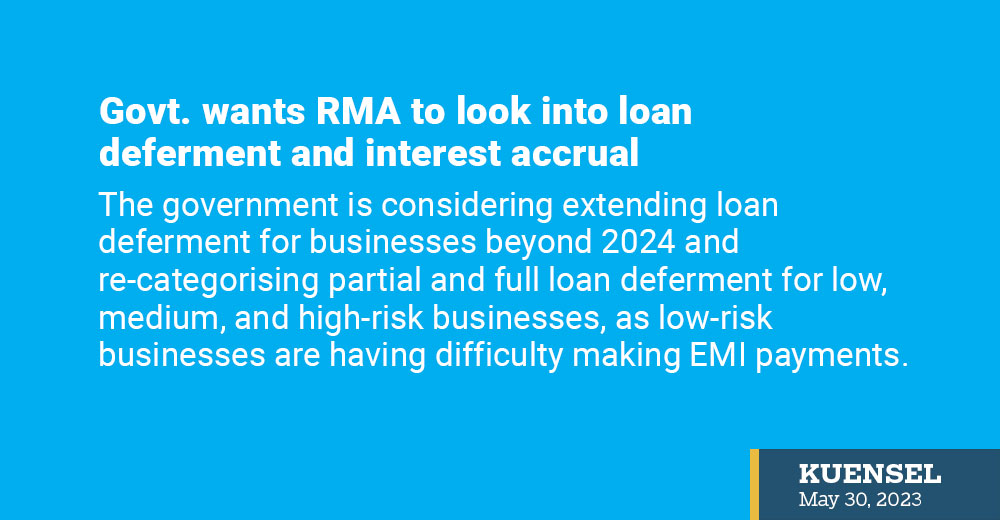Thukten Zangpo
The government intends to approach the Royal Monetary Authority (RMA) to reconsider the reclassification of the business sector in terms of loan deferment and the payment of accumulated interest under monetary measures.
On May 26, Prime Minister Dr Lotay Tshering stated this intention at the Bhutan Chamber of Commerce and Industry’s monthly public-private meeting.
As the monetary measures IV are set to expire in June this year, Ugen Tshechup Dorji, President of the Association of Bhutanese Industries, suggested that the government consider extending the loan deferment for businesses beyond 2024.
He also emphasised the need for the monetary measures IV to re-categorise partial and full loan deferment for low, medium, and high-risk businesses.
He said that low-risk businesses, including those in border towns, are having difficulty making even their equated monthly installment (EMI) payments.
Furthermore, he said that high-risk hoteliers would be unable to make their EMI payments by 2024.
High-risk sectors such as hotels, restaurants, tourism, and airlines were granted a two-year loan deferment, both full and partial, until June 2024, under the monetary measures phase IV announced in June last year.
The RMA recently extended the deferment until June 2024 for moderate and low-risk sectors that had previously been deferred until June 2023.
Construction (contract-based), hospitality, entertainment, recreational services, mining and quarrying, manufacturing enterprises, handicrafts and textile production, retail trade, commercial housing, home loans, personal loans (consumer and mortgage), transportation (commercial and non-commercial), and education loans are among these sectors.
Agriculture-related services, trade, education, and health services are classified as low-risk.
According to Prime Minister Lotay Tshering, the RMA classified businesses as high, moderate, or low risk based on their cash flow and performance during and after the pandemic.
He said that the government intends to request that the RMA reconsider the categorisation of these businesses in light of the current situation.
Prime minister also noted that borrowers need more than a year to build confidence and strategise their repayment plans.
He pointed out that sectors such as hotels and construction, which have high loan exposure, show no signs of recovery within the next year.
The interest on deferred or partially-repaid loans accumulated between phase I (April 2020) and until the deferment period will be converted to a fixed equated installment facility (FEIF) account.
FEIF accounts are established to transfer the accumulated interest during the deferment period. Borrowers will be required to repay the amount in the FEIF account in equal installments over a period of up to five years.
Ugen Tshechup Dorji expressed concern about the burden on businesses of repaying accumulated interest in five years, suggesting that it be extended to at least ten years or aligned with the loan tenure.
Recognising the need for a longer repayment period, the Prime minister said that five years would be difficult and suggested that the extension be aligned with the loan tenure. However, he warned that financial institutions would suffer losses as the ngultrum’s purchasing power dwindles.
Prime minister said that if the majority of borrowers fail to repay, it is not solely their fault, but a systemic issue. In such cases, he said he would blame the government one-third, the RMA and financial institutions one-third, and the borrowers one-third.
Prime minister emphasised that a blanket six-month moratorium for all businesses is not applicable.


